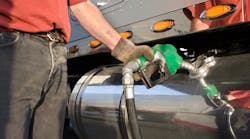Editor's note: This is the third part in a series on how drivers can affect your fleet's bottom line. Read Part 1 and Part 2 here.
Fleet Owner recently spoke with Jim Griffin, chief operating officer and chief technology officer at Fleet Advantage, to get another perspective on how drivers affect fuel economy.
Fleet Owner: When it comes to fuel economy, how much difference can a driver make?
Jim Griffin: In the past, drivers have had significant impact on fuel economy. As recently as five years ago, some estimates have the driver impact on fuel economy to be as much as 65%-70% of the contributing factors.
A driver still plays a very important role and always will, but continued technology advancements will make it easier for the driver to operate within certain boundaries and allow the technology to be the heaviest contributing factor.
There are certain key factors that can be monitored to help drivers in the areas where they have impact. For example, we use our platform, ATLAAS Unified, to help customers monitor variables like idle percentage, time in top gear, and time in cruise control.
FO: How much does the age of the truck matter?
Griffin: A good driver will always make a difference regardless of the age of the truck. The age of the truck redefines the definition of a good driver. Newer trucks provide technology that requires a different skill set to interact with the technology and use it effectively.
An older truck relies more on the experience of the driver to master the truck. For example, older trucks with manual transmissions and less technology like cruise control, collision avoidance, etc., require very different skills than the driver of a new truck that can allow the truck to either make some of the decisions or guide the driver intelligently.
FO: What other advice do you have?
Griffin: Drivers performing pre/post trips on a regular basis play a big part in keeping the trucks in the best shape possible. This helps with driver retention, customer interfacing, and overall equipment performance and resale value.
It is important to maintain proper PSI in tires to help with fuel economy, as this can reflect on the drivers’ pre/post trip. Proper specification and utilization is a key factor in getting the most out of your equipment and controlling your costs.
This is the third part in a series on how drivers can affect your fleet's bottom line. Read Part 1 and Part 2 here.




